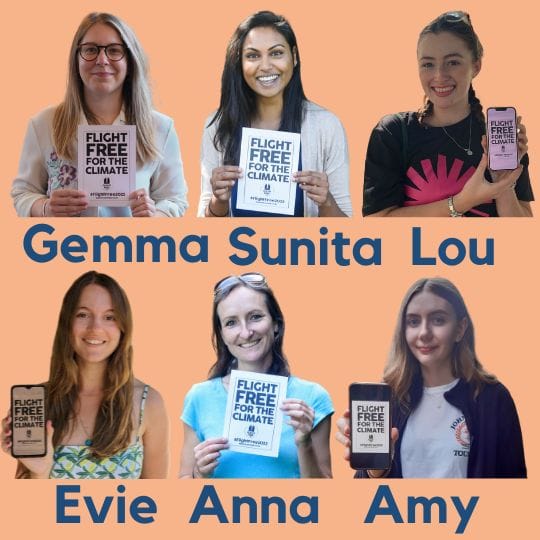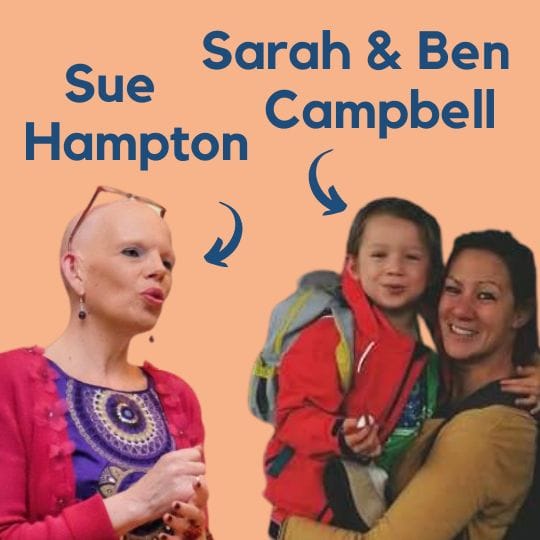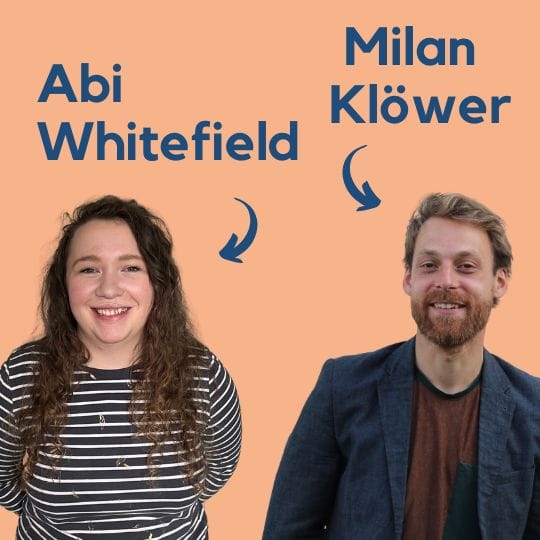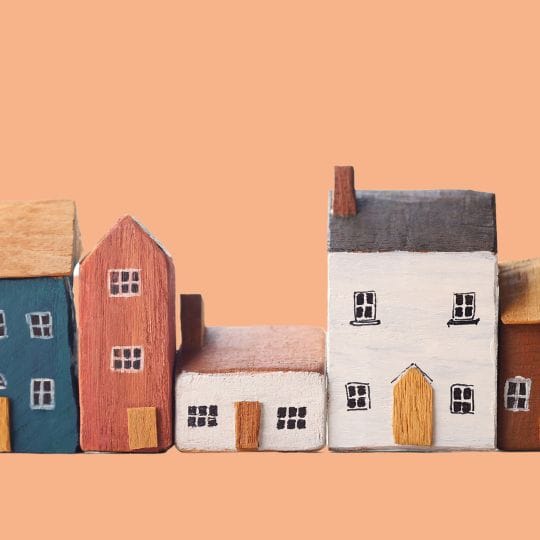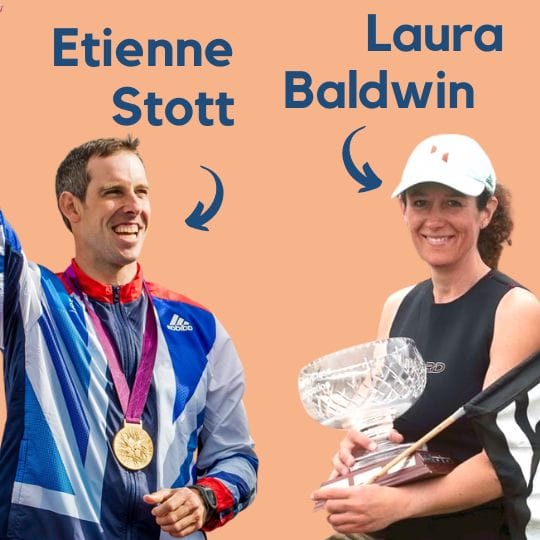2022 podcast series: Greenwash and aviation
This is episode 8 of our 2022 podcast series. Listen to the episode here and find other episodes and previous series here.
In this month’s episode we are going to be discussing greenwash in the aviation industry with Solitaire Townsend from Futerra, and Anne Kretzschmar from Stay Grounded.
What is greenwash?
Greenwash is when a company misleads consumers by making them believe a product or service is sustainable when in reality it’s not. Companies might do this by deflecting attention away from the harm they cause, or they might cast themselves as allies in the fight for climate justice when actually they are driving it, such as an oil company or an airline.
Flight Free Fact
The Dutch airline KLM is the first in the aviation industry to be taken to court for misleading its customers, by claiming that they can neutralise their flights through its offsetting schemes.
Let’s explore why airlines greenwash with our first guest, Solitaire Townsend. Have you noticed a growing trend for eco-friendly travel?
Yes. The pandemic made us notice how we travel. Since then we’ve seen a bounce-back from people desperate to see the world and business people to meet up, but we’ve also seen a consciousness around the benefits of not doing so for the climate and for our sanity.
In 2019 there was a big rise in public awareness of the climate impact of flying. Do you think the shift in public attitudes is why airlines have started to greenwash their campaigns?
Of course. Like any industry that’s under threat, they need to aggressively try to change that perspective. The air industry needs to decide if it sells travel or if it sells petrol. Meaning that if the airline industry is completely reliant on fossil fuels, then yes, growing climate awareness is a threat to them. If they are able to innovate then it wouldn’t be a risk to them.
Do you think the marketing strategy of greenwash is going to work for the airlines?
Unfortunately, yes. People greenwash because it works. The advertising industry uses psychology, sociology and neuroscience, and it’s very good at what it does. Lots of greenwash isn’t actually advertising, it’s lobby-tising. This is when companies try to convince people and regulators that the industry deserves to exist. It’s something that the oil and gas industry have been doing for years. One of the big advantages that the airline industry has is that people like to travel. One of the challenges we have is it feels like we’re anti-love, anti-travel, anti-experience. I am a big fan of showing the alternative, to show how you see your family or get a great holiday without travelling by air.
How can we hold airlines accountable for greenwashing?
We’re on the edge of being able to do this, for example, using the Paris agreement. The Paris agreement is aimed at governments and nations, but there’s a way for businesses to participate in it, which is called the Race to Zero. The Race to Zero stipulates that you have to reduce your emissions by 90-95% by 2050 and 50% by 2030. The recommendation is that companies assess their advertised emissions as part of this. How much have they increased the consumption of their goods and services through advertising, and how much carbon does that carry?
There’s a real opportunity to talk about greenwash, especially in the flight industry. So if airlines aren’t accounting for those emissions of influence, and are not acknowledging how much advertising is raising consumption, then they’re not doing Race to Zero properly, and you can’t be part of the Paris agreement, which every company wants to say that they are.
All around Europe there are campaigns to ban high-carbon advertising. It sounds difficult but I think it will be easier than people think. A carbon tax, or banning certain products is difficult, but banning advertising is really easy. It’s one single piece of legislation, and also people already know how to do it because we’ve done it with tobacco.
A lot of the ways that people can make a difference is about what they buy. Saying that we don’t have any power as individuals is really dismissive. Something you can do is point out greenwash when you see it. It helps to educate others about greenwash and helps us identify it.
Let’s look at some examples of greenwash with Anne from Stay Grounded.
Ryanair had an advert banned because it claimed it was Europe’s lowest-emitting airline, but also ranks among the EU’s top 10 emitters. How can they claim to be green while also being one of the most polluting companies in Europe?
It’s a good example of an obvious greenwash: companies are claiming things that they can’t prove. These claims are based on data from more than 10 years ago, and the company hasn’t revealed the source.
EasyJet ran a campaign with the line, Destination Zero Emissions. It directs you to a page about technology. Can you explain why technology claims are greenwash?
The net zero claim is problematic. Partly because they come too late, but also we need real zero not net zero. Generally net zero relies on offsetting which we can talk about later.
Technology isn’t greenwash in itself, but the idea of technological development is used as a distraction from the need to reduce emissions now. Airlines and industry use technology claims to justify their growth plans, but they don’t talk about how it won’t come until the distant future. We know that the industry has never kept its promises. They continually set targets to reduce emissions through technology, agro-fuel etc, then they miss the target so set a new one. They miss it again and set another one again.
EasyJet also says ‘Set Off Having Offset’. Can you explain why offsetting is also greenwash?
Offsets are one of the most problematic greenwashing strategies. Our natural systems are very complex and we cannot just apply mathematical logic to say emissions generated by a flight here equals emissions saved by tree planting there.
There are many negative environmental impacts to offsetting projects, including taking land from indigenous communities to use for offsetting planting. This leads to land grabs and human rights violations.
In the UK and Europe we don’t have enough land to compensate for all our flights, so we use land in the Global South, which is part of the injustice. It’s a kind of neocolonial logic behind these offsets.
Lastly, only a small number of offsetting projects actually work.
Four ways to spot greenwash:
-
When a company focuses on one small thing and doesn’t give the bigger picture, E.g. when an airport says they are reducing emissions from their ground operations but doesn’t mention the much larger emissions of the flights themselves, or when an airline says they don’t use single-use-plastic on board as a way to appear eco-friendly, but doesn’t mention the environmental harm of the actual flights.
- When a company says they’ve solved the problem but doesn’t say how, e.g. Ryanair claiming to be Europe’s greenest airline, but not giving any information about how they can make that claim.
- Anything that mentions offsetting!
- When companies talk about technology solutions as though they are here already.
Three things that you can do right now as a consumer to push back against greenwash:
- Be a conscious consumer – question everything!
- Avoid flying if at all possible!
- Report dodgy adverts to the Advertising Standards Authority (ASA).
Destination of the Month.
This month we’ve picked the Centre for Alternative Technology (CAT) in Wales, because not only is it in a beautiful location, it’s a place which is genuinely trying to make things better, in a world full of greenwash.
It’s deep in the Dovey valley, right on the edge of Snowdonia national park, just outside Machynlleth. You can get there by train on the Birmingham to Aberystwyth line, and if you’re into cycling, the National Cycle Network goes from the station right up to the centre. The centre itself is very family friendly, and the cafe serves food made from the produce they grow on site. There’s also genuine eco-accommodation there.
Thanks for listening!
Find out more about Solitaire Townsend here and Stay Grounded here.
Listen to the full episode here and find other episodes and previous series here.
Credits:
\ Interview conducted and produced by Lou Millington. Voiceover: Lou Millington and Anna Hughes. Intro music: The Executive Lounge By Dan Barton. Outro music: Pines and Violet by Sky Toes.
